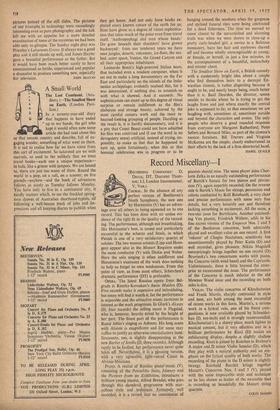A Small World
The Lost Continent. (Aca- o demy.)—The Smallest Show on Earth. (London Pavi- IN a seventy-year-old diary 0 that happens to have ended
up in my hands, the girl who kept it would often note some article she had read about this or that remote country and describe, full of en- gaging wonder, something of what went on there. It is sad to realise how far we have come from this sort of excitement. So saturated are we with marvels, so used to the unlikely that we treat travel books—each one a unique experience— in bulk, like a grocer with jampots. We are bound to, there are just too many of them. Round the world in a jeep, on a raft, on a scooter, on five pounds—anyhow—and the book of adventures follows as surely as Tuesday follows Monday. You haVe only to live in a continental city, it hardly matters which, to see the freckled spring- time droves of Australian shorthand-typists, all following a well-beaten track of jobs and im- pressions and all keeping diaries to publish when they get home. And not only have books ex- plored every known corner of the earth for us; films have given us a degree of visual sophistica- tion that takes much of the point even from travel itself. `Anthropophagi and men whose heads/ Do grow beneath their shoulders' have grown hackneyed : from our tenderest years we have seen jungles, deserts, volcanoes, ice-floes, the sea- bed, outer space, Venice, the Grand Canyon and all their appropriate inhabitants.
Leonardo Bonzi's high-powered Italian team, that included even a resident composer, when it set out to make a long documentary on the Far East and particularly on the islands of the Indo- nesian archipelago, evidently realised this, for it was determined, if nothing else, to astonish :us with what it showed. And it succeeds. No sophistication can stand up to this degree of visual surprise or remain indifferent to the film's elaborate and strange beauty, achieved by the most careful camera work and the most re- hearsed-looking grouping of people. Dazzling as the result is, it is hardly documentary, and it is a pity that Count Bonzi could not have admitted his film was contrived and (I use the word in no derogatory sense) artificial, instead of trying, im- possibly, to make us feel that he happened to turn up, quite fortuitously, when this or that biennial celebration was in progress or to be
hanging around the seashore when the gorgeous and stylised funeral rites were being celebrated for a dead fisherman. The time we seemed to come closest to the unvarnished and alarming truth was when we were shown in close-up a pretty curly-headed girl, a novice in a Balinese monastery, have her hair and eyebrows shaved off and become wholly unrecognisable as young, or female, or herself, in just a few minutes, to the accompaniinent of a beautiful, melancholy and sinister chant.
The Smallest Show on Earth, a British comedy with a moderately bright idea about a couple who find themselves heirs to a decrepit Ed- wardian cinema, is rather dispiriting because it ought to be, and nearly keeps being, much better than it is. Basil Dearden, the director, seems unable to decide whom he is trying to get the laughs from and just where exactly the central joke is supposed to lie; so that sometimes we are laughing with, sometimes at, sometimes outside and beyond the characters and events. The only people who deserve a good rounded responSe from everyone are Margaret Rutherford, Peter Sellers and Bernard Miles, as part of the cinema's rococo furniture. Bill Travers and Virginia McKenna are the couple, clearly embarrassed in their efforts by the lack of a firm directorial hand.
ISABEL QUIGLY


































 Previous page
Previous page